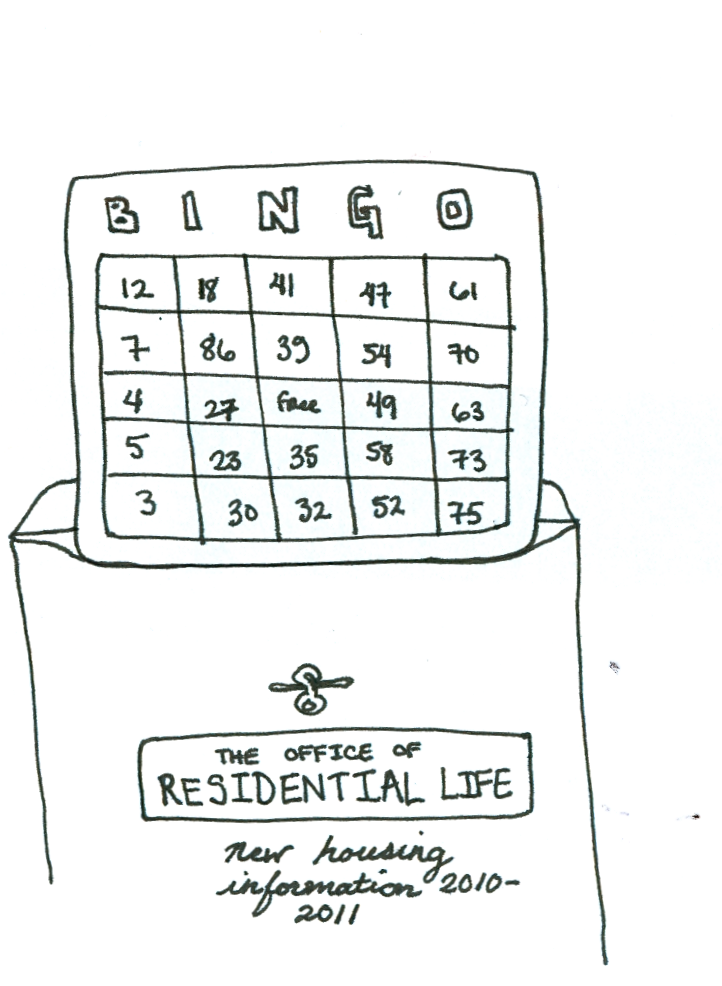
Courtesy of Jordan Cicoria.
With 1,177 students, UR’s class of 2014 is the largest ever, beating the record set two years ago by the class of 2012. Alongside growing class sizes, demand for on-campus housing continues to outstrip supply, and competition for the best spots has become increasingly fierce.
While this presently only affects freshman housing, in the coming years upper-class dorms will also begin to feel the strain. With even the most undesirable rooms being contested, anyone who lives on campus is affected. Even Southside no longer needs to offer the coveted bonus half point, once necessary to counterbalance the pariah status of living there.
Part of this problem exists because freshmen are required to live on-campus but are only permitted to occupy certain dorms. Even when there is extra room in upper-class dorms, freshmen are forced to suffer through claustrophobic living conditions. Meanwhile, I know of one suite in Hill Court where two students have moved out, leaving enough space to open up a hotel.
In another instance, a sophomore friend on the quad, who — for fear that the room will be taken away — will not be named, has a double to herself. This so-called “dingle” gives her access to a palatial king-size bed and lots of open space. Subletting aside, if there is enough leeway to allow “dingles” or even “troubles” then finding campus housing should not be as large a problem as it often becomes.
While I understand the benefit of meeting classmates on a freshman hall, this imbalance could easily be corrected by allowing willing freshmen to live with upperclassmen.
This solution could alleviate the strain on freshman housing, and I doubt it would cause a disaster. In fact, freshmen are currently permitted to transfer into special interest housing in the spring semester, and this has yet to cause any problems.
Still, freshmen don’t have the exclusive rights to housing troubles. Last year, when I was planning a suite in Hill Court, one of my friends was unable to afford tuition in time and was excluded from the housing lottery. Within a week — when he had saved up enough money to pay — he was placed in waiting-list limbo, with no clear housing future.
Meanwhile, our suite’s empty slot was added to the shortlist of extra rooms. While he eventually did find a space, the original group was separated. In cases like this, students should be given some leeway to temporarily sign their name to a housing contract. At the very least, the housing system should allow a matchmaking scheme, rather than leaving the final decision to the Res Life roulette wheel.
Even when you plan months in advance, student housing can provide a migraine. For next semester, I am planning to live with a group of people currently studying abroad, and it can be a hassle trying to coordinate meetings between four continents.
Of course, Res Life only makes the process harder. Once overseas, Res Life does not allow students to draft a housing contract independently and requires a proxy to even enter the lottery.
About a third of all students study abroad — and it is even required for international relations majors — so this scenario is not particularly unusual.
There needs to be increased flexibility and understanding with housing arrangements for returning students. As a possible solution, they should have the opportunity to sign a housing contract in the fall before leaving.
University services exist — as the name implies — to serve students. This is especially true in the case of housing, where we pay an arm and a leg to live on campus. In fact, a back-of-the-envelope calculation reveals that the cost for a group of students renting a room at the Staybridge Suites across the river is considerably cheaper than living anywhere on campus.
When Res Life acts as only an additional layer of muddled bureaucracy, there is a serious problem. All things considered, I guess my best choice is just to live off campus.


